Verona, Italy is renowned for its rich culinary heritage, and one of the region’s most prized delicacies is traditional balsamic vinegar from Modena. Visitors can now experience the complexity of this artisanal product through a guided tasting session. Over the course of an hour, guests will sample a variety of IGP and DOC balsamic vinegars, discovering the nuances in flavor and production methods that make each one unique. Paired with artisanal cheeses, breads, and fresh fruit, this tasting promises to be a true delight for the senses.
- Key Points
- Overview of the Balsamic Vinegar Experience
- Exploring the History and Production of Balsamic Vinegar
- Discovering the Differences Between IGP and DOC Balsamic Vinegars
- Experiencing Italian Gastronomy Beyond Pasta and Pizza
- Tasting the Diverse Flavors and Emotions of Balsamic Vinegar
- Sampling the Various Types of Balsamic Vinegar
- Pairing Balsamic Vinegar With Cheese, Bread, and Fruit
- Meeting Point and Accessibility Considerations
- Frequently Asked Questions
- Can I Bring My Own Balsamic Vinegar to the Tasting?
- What Should I Wear to the Balsamic Vinegar Tasting?
- Is the Tasting Suitable for Vegetarians and Vegans?
- Can I Purchase Balsamic Vinegar at the End of the Tasting?
- How Long Does the Balsamic Vinegar Aging Process Typically Take?
- The Sum Up
- More Walking Tours in Verona
- More Tours in Verona
- More Tour Reviews in Verona
- Still browsing? Here are more Verona experiences we've covered recently
Key Points
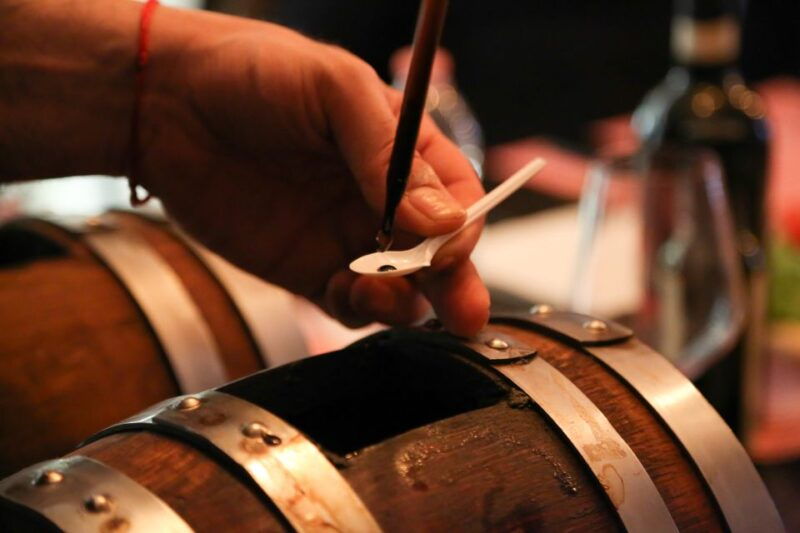
- Discover the rich history and intricate production process of traditional balsamic vinegar from the Modena and Reggio Emilia regions during a one-hour tasting experience in Verona.
- Learn the distinctions between IGP and DOC balsamic vinegars, including their production methods, aging requirements, and flavor profiles.
- Explore authentic Italian gastronomy beyond pasta and pizza by sampling balsamic vinegar pairings with artisanal cheeses, breads, and fruits.
- Attend the tasting at the charming meeting point of Via Leoncino 31 in Verona, with alternative transportation options recommended due to limited parking.
- Enjoy the balsamic vinegar tasting experience in English, Italian, or Russian, with a free cancellation policy up to 24 hours in advance.
Overview of the Balsamic Vinegar Experience
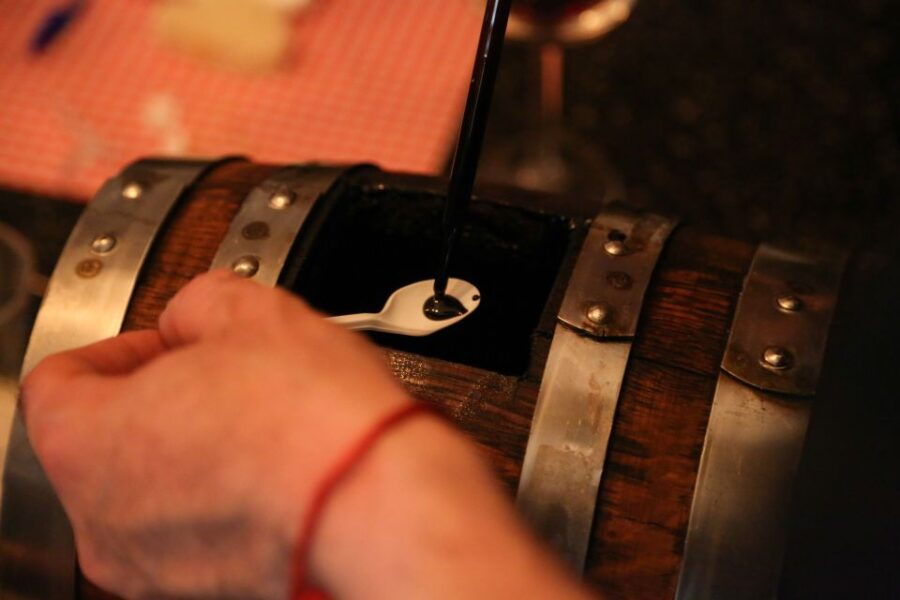
Though the traditional balsamic vinegar tasting in Verona, Italy lasts just an hour, it offers visitors an immersive experience exploring the history and production of this acclaimed local delicacy.
For $48.96 per person, guests can sample various types of IGP and DOC balsamic vinegars, learning the differences between them.
Pairings include cheese, bread, and fruit, complemented by sparkling or still water.
The tasting is available in English, Italian, and Russian, and there’s a free cancellation policy up to 24 hours in advance.
The meeting point is in central Verona, though parking can be tricky for those driving.
Hungry for more Verona flavors? We've covered these other food and drink spots
Exploring the History and Production of Balsamic Vinegar
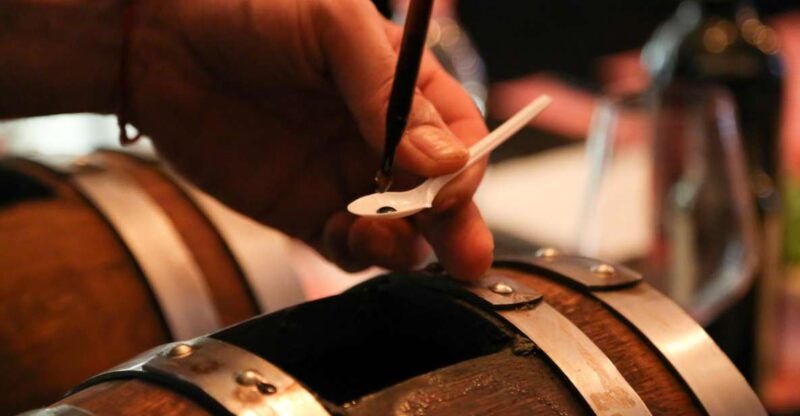
As visitors embark on the traditional balsamic vinegar tasting, they explore the rich history and intricate production process that have made this local delicacy renowned as "black gold."
The guide expertly navigates guests through the intriguing origins of balsamic vinegar, tracing its roots back to the ancient Modena and Reggio Emilia regions of Italy.
Guests learn the distinctions between IGP and DOC designations, understanding the nuances that define true Aceto Balsamico Tradizionale.
The nuances that define true Aceto Balsamico Tradizionale are explored through the IGP and DOC designations, enlightening guests.
The tasting offers a sensory exploration, revealing the complex flavors and aromas cultivated through years of aging in wooden casks – a true celebration of Italian gastronomy.
Discovering the Differences Between IGP and DOC Balsamic Vinegars
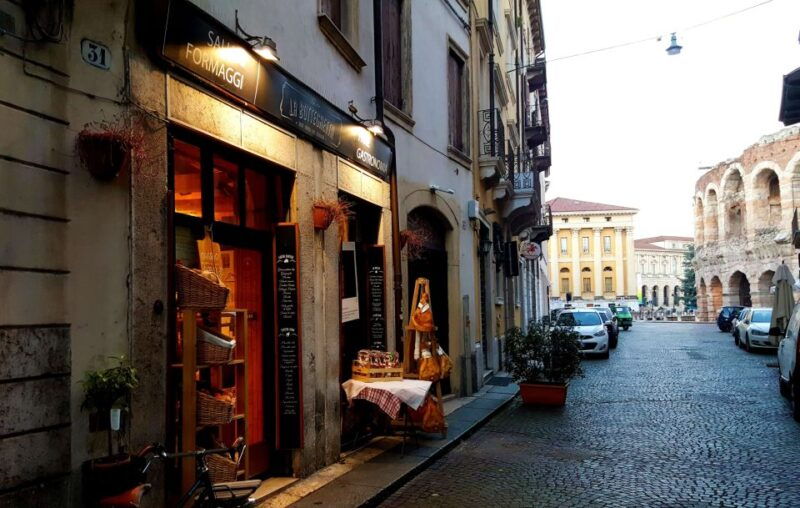
During the balsamic vinegar tasting, guests learn to distinguish the key differences between IGP and DOC balsamic vinegars.
IGP balsamic vinegar is a more affordable option, with a less complex flavor profile. In contrast, DOC balsamic vinegar undergoes a more rigorous production process, resulting in a richer, more nuanced taste.
The key differences include:
-
Production region: IGP can be produced in the wider Emilia-Romagna area, while DOC is limited to the traditional Modena region.
-
Aging: DOC must be aged for a minimum of 12 years, compared to 6 months for IGP.
-
Ingredients: DOC uses only the must of Trebbiano and Lambrusco grapes, while IGP may include other grape varieties.
-
Flavor profile: DOC is deeper, sweeter, and more complex, while IGP is lighter and more acidic.
Experiencing Italian Gastronomy Beyond Pasta and Pizza
While the tasting experience focuses on the nuances of traditional balsamic vinegar, it also provides an opportunity to explore Italian gastronomy beyond the more well-known dishes of pasta and pizza. Participants can discover a range of local flavors and pairings, from artisanal cheeses to freshly baked breads and seasonal fruits. This allows them to engage their senses and appreciate the depth of Italian culinary traditions. The experience encourages visitors to step outside their comfort zone and enjoy the unique tastes and textures that define authentic Italian cuisine.
| Cheese | Bread | Fruit |
| — | — | — |
| Parmesan | Focaccia | Apples |
| Pecorino | Ciabatta | Figs |
| Gorgonzola | Piadina | Grapes |
More Great Tours NearbyTasting the Diverse Flavors and Emotions of Balsamic Vinegar
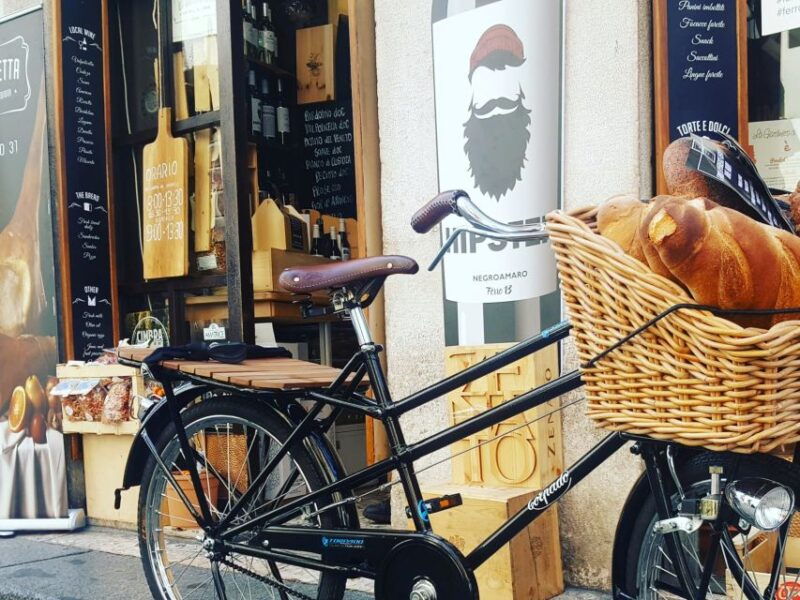
What exactly makes traditional balsamic vinegar so captivating?
It’s the complex, layered flavors that dance on your palate, revealing a symphony of emotions. From the initial burst of sweetness to the subtle tart notes, the experience is truly multidimensional.
During the tasting, you’ll have the chance to:
-
Sample various types of balsamic vinegar, each with its own distinct character.
-
Discover how the vinegar pairs deliciously with cheese, bread, and fruit.
-
Cleanse your palate with sparkling or still water between tastings.
-
Appreciate the nuances that differentiate IGP and DOC balsamic vinegars.
This tasting is a journey through the rich heritage and artistry of Italian gastronomy.
Sampling the Various Types of Balsamic Vinegar
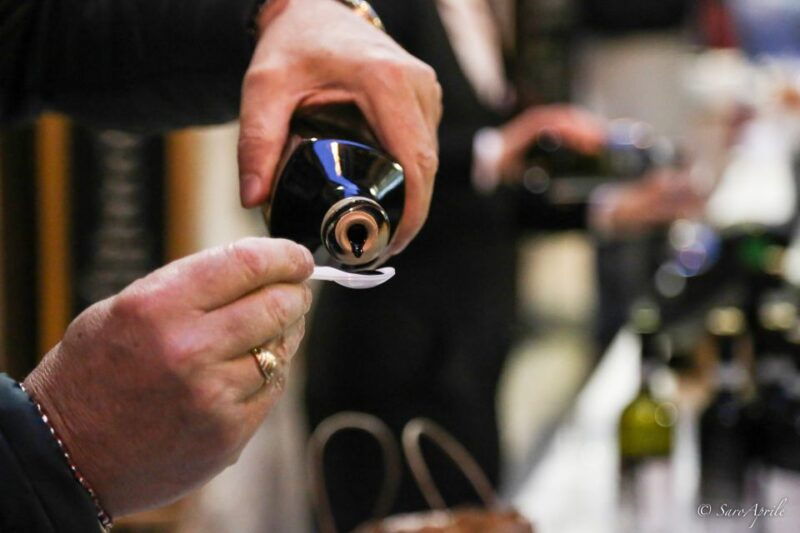
As guests arrive at the tasting, they’ll discover an array of balsamic vinegars laid out before them. The guide explains the differences between IGP and DOC varieties, noting the nuances in color, aroma, and viscosity.
Guests are invited to dip small pieces of bread into the vinegars, savoring the complex flavors. Some are sweet and syrupy, others tart and bold.
Cheese and fruit are offered as palate cleansers between samples. Sips of sparkling or still water help refresh the senses.
It’s a tactile experience, allowing guests to fully engage with these beloved artisanal products from Modena.
Pairing Balsamic Vinegar With Cheese, Bread, and Fruit
How do the various pairings enhance the balsamic vinegar tasting experience? The expert guides know the perfect accompaniments to bring out the complex flavors of the vinegar.
Pairing it with:
Creamy cheeses like Parmigiano-Reggiano or Grana Padano allow the sweetness and acidity to cut through the richness.
-
Creamy cheeses like Parmigiano-Reggiano or Grana Padano allows the sweetness and acidity to cut through the richness.
-
Freshly baked bread provides a neutral base to cleanse the palate between samples.
-
Juicy fruits like figs or grapes complement the vinegar’s intensity with their natural sweetness.
-
Sparkling or still water helps cleanse the palate, allowing guests to fully appreciate each nuanced balsamic.
These thoughtful pairings elevate the tasting, creating a truly immersive Italian culinary experience.
Meeting Point and Accessibility Considerations
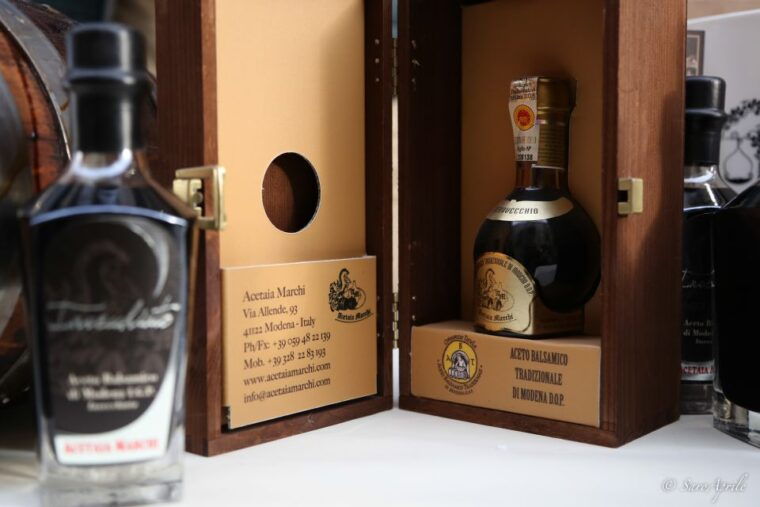
The meeting point for the Traditional Balsamic Vinegar Tasting experience is located at Via Leoncino 31 in Verona.
While the setting provides a charming ambiance, parking can be challenging for visitors driving from outside the city. Participants are advised to consider alternative transportation options, such as public transit or ridesharing, to avoid the hassle of finding parking.
The experience’s accessibility may also be a consideration for some guests, so it’s recommended to inquire about any specific needs or accommodations prior to booking.
Frequently Asked Questions
Can I Bring My Own Balsamic Vinegar to the Tasting?
It’s generally not recommended to bring your own balsamic vinegar to the tasting. The experience is designed to showcase the local specialty products, so the provided samples are an integral part of the experience. You’re encouraged to fully engage with the tasting as intended.
What Should I Wear to the Balsamic Vinegar Tasting?
When attending a balsamic vinegar tasting, it’s best to wear comfortable, casual clothing. Avoid anything too formal or fancy, as the focus should be on the tasting experience itself. Opt for breathable fabrics and layers in case the tasting room is chilly.
Is the Tasting Suitable for Vegetarians and Vegans?
The tasting should work for vegetarians and vegans, as the pairings include cheese, bread, and fruit – no meat or animal products are involved. However, it’s best to check with the organizers ahead of time to confirm the options.
Can I Purchase Balsamic Vinegar at the End of the Tasting?
Yes, visitors can purchase balsamic vinegar at the end of the tasting. The experience provides an opportunity to sample and buy various types of the prized Italian condiment directly from the producer.
How Long Does the Balsamic Vinegar Aging Process Typically Take?
The balsamic vinegar aging process typically takes 12 to 25 years. The longer the aging, the more complex and concentrated the flavors become. This prolonged maturation is what gives traditional balsamic vinegar its distinctive taste and texture.
The Sum Up
Enjoy the rich history and flavors of Verona’s traditional balsamic vinegar. This tasting experience offers an opportunity to explore the complexity of IGP and DOC varieties, expertly paired with local delicacies. Discover the nuances of this culinary treasure as you savor the aromas and textures, gaining a deeper appreciation for Italian gastronomy beyond the classic dishes. Don’t miss this chance to elevate your taste buds at Via Leoncino 31.
You can check availability for your dates here:More Walking Tours in Verona
- Verona: Private Walking Tour with a Local
- Verona Walking Tour with Audio and Written Guide by a Local
- Hidden and fascinating Verona – 3 hour private walking tour
- Dark Historical Verona Walking Tour
- Verona Guided Walking Tour of the City’s Top Highlights
- Verona Private Walking Tour: Romance, History & Hidden Gems
More Tours in Verona
More Tour Reviews in Verona
Still browsing? Here are more Verona experiences we've covered recently
- 14 Best Wine Tours In Verona (With Prices)
- Which Verona Cruises And Boat Tours To Choose? Our Best 3 Picks
- What Are The Best Workshops & Classes In Verona? Our Top 6 Picks
- 14 Best Walking Tours In Verona
- The Top 14 Verona Tours
- 14 Of The Best Tours & Experiences In Verona
- We Rank The 3 Best Lunch Experiences In Verona
- Verona’s 4 Best Historical Tours
- You’ll Love These 3 Pasta Experiences In Verona
- We Rank The 12 Best City Tours In Verona
- The Top 3 Dining Experiences In Verona
- 5 Best Bike Tours In Verona
